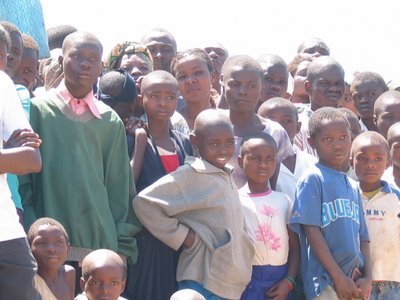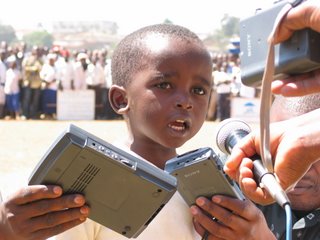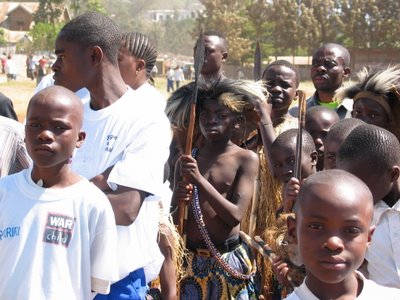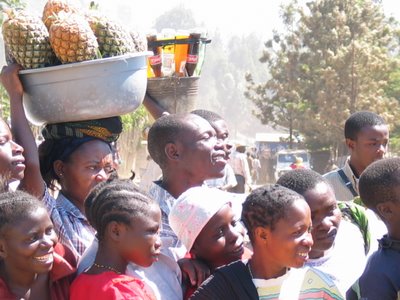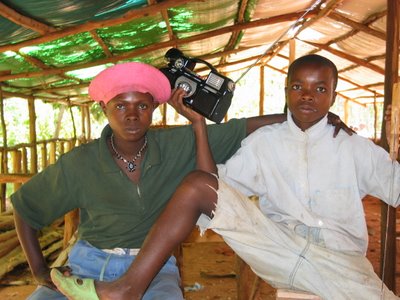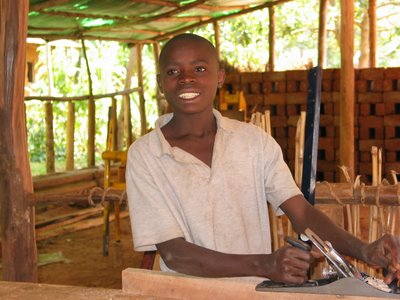Kamembe-Kigali-Nairobi-Amsterdam
I'm off to The Netherlands for work-related meetings (and just a tiny bit of shopping!). Hope to take a few more snaps of canals to post while I'm there. Looking forward to seeing Europe in full bloom!
After four years in Rwanda and DR Congo I was diagnosed with myalgic encephalomyelitis in Oct ‘08. Following two years in Malta, I moved to Melbourne, Australia where I found a doctor who diagnosed fructose intolerance and - eventually - Lyme Disease. My health improved, I returned to work, and next week I'm going back to my former life on the Big Island of Hawaii. Take a look at older posts (2004-2008) for stories & photos from Africa.
Tuesday, June 27, 2006
Saturday, June 24, 2006
16 June 2006 Day of the African Child
"The day marks a 1976 march in in Soweto South Africa, when thousands of black school children took to the streets to protest the inferior quality of their education and to demand their right to be taught in their own language. Hundreds of young boys and girls were shot down; and in the two weeks of protest that followed, more than a hundred people were killed and more than a thousand were injured.
To honour the memory of those killed and the courage of all those who marched, the Day of the African Child has been celebrated on 16 June every year since 1991, when it was first initiated by the Organization of African Unity. The Day also draws attention to the lives of African children today." (UNICEF)
"The day marks a 1976 march in in Soweto South Africa, when thousands of black school children took to the streets to protest the inferior quality of their education and to demand their right to be taught in their own language. Hundreds of young boys and girls were shot down; and in the two weeks of protest that followed, more than a hundred people were killed and more than a thousand were injured.
To honour the memory of those killed and the courage of all those who marched, the Day of the African Child has been celebrated on 16 June every year since 1991, when it was first initiated by the Organization of African Unity. The Day also draws attention to the lives of African children today." (UNICEF)
Wednesday, June 21, 2006

16 June 2006: Day of the African Child. T-shirt with a message: "children are counting on credible elections". (Presidential elections in DR Congo are scheduled for 30th July this year.)
Tuesday, June 20, 2006
Sunday, June 18, 2006

16 June 2006: Day of the African Child. Former child soldiers in Bukavu. Their sign reads: "Pour un Congo sans enfant soldat" (for a Congo without child soldiers).
Wednesday, June 14, 2006

This young man was very keen to go back to town with us. He's at a center that assists orphans and former child soldiers about an hour's drive from the city. For more information on child soldiers, take a look at these web sites: http://hrw.org/campaigns/crp/index.htm
http://web.amnesty.org/pages/childsoldiers-index-eng
http://www.vachss.com/help_text/child_soldiers.html
Monday, June 12, 2006
Weekend Adventure
The Rwandan border is a 30 minute walk from our office/home, but our driver gave me a ride down at 13:30 on Friday afternoon last week. I had been planning to take the 15:00h (3 o'clock) bus from Kamembe in Rwanda to Butare. At about 13:20 our driver, Emmanuel, came and said "I thought you were going to Butare". It turned out there was no 3 o'clock bus, but if I were lucky I might just get the last one at 2 o'clock. I shut down my computer, grabbed my back pack and jumped into the car. I tried my best not to look impatient while the DRC immigration officer took forever to write down my passport details by hand in his blue note book as he kept a running conversation going with other staff at the same time. As he finished, I grabbed my passport, walked down the hill between the DRC side and the bridge over the river that marks the Rwandan border. A form to fill on the Rwandan side, and then a quick look for transport for the 10 minute drive up the hill from Cyangugu to Kamembe. Nothing, not a mini-bus in sight. I tried asking an NGO car for a ride, but they were headed towards Burundi - wrong direction. I began walking up the hill, and realised I'd never make it in time. Finally I just decided to enjoy the scenery and the sudden peacefulness of the Rwandan countryside that constrasted so unexpectedly with the hustle and bustle just over the border in Congo. I walked up the hill to the Presbytarian Peace Guesthouse to see about getting a room for the night - full! I was ready to walk back down the hill and return to the office: it wouldn't take too long. Just before I headed back down, it occurred to me to call a former colleague, Samuel, who lives in Kamembe, not really expecting to find him home as I knew he was going for a working visit to Bangladesh. Miraculously he was just back, and immediately invited me to stay the night with his family. He came to find me. First we went to the hospital where his 7-month old son was recovering from pneumonia, and to meet his wife and eldest daughter who were there taking care of the baby. Then we slowly walked to his home, accompanied by his 7-year old twins, a boy and a girl, stopping to visit some neighbours on the way.
In the morning I was up at six, and caught the 7 am mini-bus headed for Kigali (via Butare). One of the things I like about Rwanda is that a 7 am bus pretty much leaves on time: we left at 7:10. When people don't arrive on time others don't have a lot of sympathy. So when, about ten minutes into our trip, the driver gets a call from the office saying that a passenger with a pre-paid ticket had showed up for the bus and we should stop and wait for him to catch up with us on a motorbike, the other passengers started mumbling and making comments among themselves. As we waited, the chorus of "tugende" ("let's go") got more insistent. About a second before the driver would have been persuaded to start off again, the missing passenger arrived on a motorbike and clambered aboard. I don't think he apologised.
Another good thing about the Rwandan buses is that 15-seater buses only carry 15 passengers - not the 25 or so that you'd find squeezed onto a bus across the border. For mini-buses that go directly between towns, the drivers are not obliged to pick up passengers en route, and usually (at least between Butare and Kigali) they won't. Cyangugu to Butare is another matter, as transport is far less frequent, and undoubtedly the drivers have some sympathy for people needing a ride along the way. On that morning we had a couple of seats to spare and the driver stopped at the start of Nyungwe forest to pick up two women with three small children between them. The 90-minute drive through the forest is marked by nasty twists and turns in the road, and Rwandans, not being good travellers on such roads, are frequently sick along the way. I prayed that the two young men on either side of me would not succumb, and I was lucky. The row immediately in front of me was another matter. The youngest baby of about eight or nine months was probably ill to begin with - he had a wizened face and screamed as loud as he was capable, while violently throwing his body around, sometimes hitting the other young boy with his hand or head. The boy of about six years bore it quietly, but also kept throwing up, a tear running down one cheek the only indication of his own misery as he was made to stand, no seat space being available for him. The other baby, a girl of maybe 12 months dressed in a frilly pink dress, was soon, thankfully, fast asleep. As the situation became more difficult, the thoughtful young man next to me offered to hold the baby girl, allowing her mother to help the other woman. The mother of the sick baby looked exhausted, thin, and probably very sick herself. I hoped they were headed for a hospital. The driver, in the meantime, was clearly regretting his decision to pick up the passengers, and kept looking back at them saying angry sounding things. Mercifully, as we left the forest, the sick baby and young boy both fell asleep, and the rest of the way to Butare was uneventful.
I arrived in Butare at 10:15 am, jumped out of the mini-bus, and headed for my former colleague's new house. It turned out she was at the office, so I stopped off and enjoyed tea and peanut butter cookies with Jessica and Antonia. It was such a pleasure to be back with good friends in Butare! But all too short. A whirl-wind 24 hours in which I met up with a friend from Kigali, had lunch with a friend from Niger - and enjoyed listening to the fascinating story of his childhood as the first person from his village to complete secondary school and then university - went to a small party, saw a couple more friends and former colleagues, and then at 11 am on Sunday morning hopped back onto the mini-bus to Kamembe/Cyangugu. The bus stops at Kamembe, and from there I took a "taxi velo" (bike taxi) down the hill to the border. There is something delightful about silently whizzing down a hill surrounded by the fresh scent of eucalyptus and a view of lake Kivu and the town of Bukavu in the not so far distance. Crossing back over the border on a Sunday afternoon was a relaxed affair. The same man wrote down my passport details all over again in his blue book. No one tried to ask for a bribe. And my colleague was able to come and meet me with the car, saving me the 30 minute walk.
It was wonderful to be back in Butare, but the lack of frequent transport, and the three+ hour drive really makes it just a bit too far to go for the weekend.
The Rwandan border is a 30 minute walk from our office/home, but our driver gave me a ride down at 13:30 on Friday afternoon last week. I had been planning to take the 15:00h (3 o'clock) bus from Kamembe in Rwanda to Butare. At about 13:20 our driver, Emmanuel, came and said "I thought you were going to Butare". It turned out there was no 3 o'clock bus, but if I were lucky I might just get the last one at 2 o'clock. I shut down my computer, grabbed my back pack and jumped into the car. I tried my best not to look impatient while the DRC immigration officer took forever to write down my passport details by hand in his blue note book as he kept a running conversation going with other staff at the same time. As he finished, I grabbed my passport, walked down the hill between the DRC side and the bridge over the river that marks the Rwandan border. A form to fill on the Rwandan side, and then a quick look for transport for the 10 minute drive up the hill from Cyangugu to Kamembe. Nothing, not a mini-bus in sight. I tried asking an NGO car for a ride, but they were headed towards Burundi - wrong direction. I began walking up the hill, and realised I'd never make it in time. Finally I just decided to enjoy the scenery and the sudden peacefulness of the Rwandan countryside that constrasted so unexpectedly with the hustle and bustle just over the border in Congo. I walked up the hill to the Presbytarian Peace Guesthouse to see about getting a room for the night - full! I was ready to walk back down the hill and return to the office: it wouldn't take too long. Just before I headed back down, it occurred to me to call a former colleague, Samuel, who lives in Kamembe, not really expecting to find him home as I knew he was going for a working visit to Bangladesh. Miraculously he was just back, and immediately invited me to stay the night with his family. He came to find me. First we went to the hospital where his 7-month old son was recovering from pneumonia, and to meet his wife and eldest daughter who were there taking care of the baby. Then we slowly walked to his home, accompanied by his 7-year old twins, a boy and a girl, stopping to visit some neighbours on the way.
In the morning I was up at six, and caught the 7 am mini-bus headed for Kigali (via Butare). One of the things I like about Rwanda is that a 7 am bus pretty much leaves on time: we left at 7:10. When people don't arrive on time others don't have a lot of sympathy. So when, about ten minutes into our trip, the driver gets a call from the office saying that a passenger with a pre-paid ticket had showed up for the bus and we should stop and wait for him to catch up with us on a motorbike, the other passengers started mumbling and making comments among themselves. As we waited, the chorus of "tugende" ("let's go") got more insistent. About a second before the driver would have been persuaded to start off again, the missing passenger arrived on a motorbike and clambered aboard. I don't think he apologised.
Another good thing about the Rwandan buses is that 15-seater buses only carry 15 passengers - not the 25 or so that you'd find squeezed onto a bus across the border. For mini-buses that go directly between towns, the drivers are not obliged to pick up passengers en route, and usually (at least between Butare and Kigali) they won't. Cyangugu to Butare is another matter, as transport is far less frequent, and undoubtedly the drivers have some sympathy for people needing a ride along the way. On that morning we had a couple of seats to spare and the driver stopped at the start of Nyungwe forest to pick up two women with three small children between them. The 90-minute drive through the forest is marked by nasty twists and turns in the road, and Rwandans, not being good travellers on such roads, are frequently sick along the way. I prayed that the two young men on either side of me would not succumb, and I was lucky. The row immediately in front of me was another matter. The youngest baby of about eight or nine months was probably ill to begin with - he had a wizened face and screamed as loud as he was capable, while violently throwing his body around, sometimes hitting the other young boy with his hand or head. The boy of about six years bore it quietly, but also kept throwing up, a tear running down one cheek the only indication of his own misery as he was made to stand, no seat space being available for him. The other baby, a girl of maybe 12 months dressed in a frilly pink dress, was soon, thankfully, fast asleep. As the situation became more difficult, the thoughtful young man next to me offered to hold the baby girl, allowing her mother to help the other woman. The mother of the sick baby looked exhausted, thin, and probably very sick herself. I hoped they were headed for a hospital. The driver, in the meantime, was clearly regretting his decision to pick up the passengers, and kept looking back at them saying angry sounding things. Mercifully, as we left the forest, the sick baby and young boy both fell asleep, and the rest of the way to Butare was uneventful.
I arrived in Butare at 10:15 am, jumped out of the mini-bus, and headed for my former colleague's new house. It turned out she was at the office, so I stopped off and enjoyed tea and peanut butter cookies with Jessica and Antonia. It was such a pleasure to be back with good friends in Butare! But all too short. A whirl-wind 24 hours in which I met up with a friend from Kigali, had lunch with a friend from Niger - and enjoyed listening to the fascinating story of his childhood as the first person from his village to complete secondary school and then university - went to a small party, saw a couple more friends and former colleagues, and then at 11 am on Sunday morning hopped back onto the mini-bus to Kamembe/Cyangugu. The bus stops at Kamembe, and from there I took a "taxi velo" (bike taxi) down the hill to the border. There is something delightful about silently whizzing down a hill surrounded by the fresh scent of eucalyptus and a view of lake Kivu and the town of Bukavu in the not so far distance. Crossing back over the border on a Sunday afternoon was a relaxed affair. The same man wrote down my passport details all over again in his blue book. No one tried to ask for a bribe. And my colleague was able to come and meet me with the car, saving me the 30 minute walk.
It was wonderful to be back in Butare, but the lack of frequent transport, and the three+ hour drive really makes it just a bit too far to go for the weekend.
Thursday, June 01, 2006


Thinking of Hawaii: spotted this t-shirt on one of the children this week. Probably donated to a Goodwill store by someone in Hawaii, and then sent over to East Africa, where the second hand clothes are sold (not given away!) in the markets. The large amount of second hand clothing that floods the market in East Africa has undermined local clothing manufacturers.
Subscribe to:
Comments (Atom)
